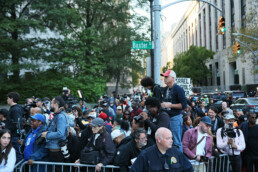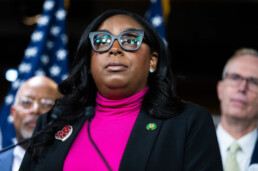A Bigger, Badder, Bunnier Bowl
 February 5, 2026 Hey there Meteor readers, Nona and I both woke up this morning with fevers and intense cases of the daycare schmutz. So this newsletter is brought to you by Tylenol, Ricola, and some nasty-ass ginger tea.  Today, we’re going full Sporty Spice with some emotional prep for Bad Bunny’s halftime performance this weekend. Plus three questions about what athletes are facing at the Winter Olympics. Achoo 🤧, Shannon Melero  WHAT'S GOING ONDomingo Gigante: Last weekend, during his Grammy acceptance speech for Album of the Year, Bad Bunny opened with a vastly underappreciated line: “Puerto Rico, créeme cuando te digo que somos mucho más grandes que 100 por 35.” If you haven’t gotten your Duolingo minutes in today, that’s “Believe me when I tell you, we’re so much bigger than 100x35,” which are the land measurements of Puerto Rico’s main island. The rest of his message, delivered mostly in Spanish, touched on perseverance. But the idea of being bigger is what’s stayed with me these last few days, particularly in a political moment where the best thing anyone can be is unseen. Unseen by ICE agents lingering in train stations. Unseen by trigger-happy police officers. Unseen by right-wing extremists. Stepping out of my house every day, my greatest desire is for my family to go completely unnoticed and make it back safely. But throughout his career, Bad Bunny has defied the idea of being small, of asking permission to enter a space as his authentic self. He just shows up. He simply is, and he does it loudly, boldly, and sometimes in a fabulous gown. He’s done so in a way that his musical forefathers—DY, Marc Anthony, Tego Calderon—never could because they were either trapped in the Latin music gilded cage, or chose to avoid politics until much later in life. For all their fame, they were also kept smaller by (mostly) American audiences and an industry that sees Latin music and people as separate from the American identity. But in the words of another great, Residente, “América no es solo USA, papá.”  HOW WE'RE ALL ABOUT TO BE SMILING THIS SUNDAY. (VIA GETTY IMAGES) Of course, the ability to make yourself more or less visible is rooted in privilege. White and light-skinned artists can take a step back *cough* JLo *cough* in a way that protects them from the ire of entire administrations. After all, Turning Point wasn’t running counter programming in 2020 when JLo and Shakira headlined the halftime show. Conservatives did, however, have a ton to say after Kendrick Lamar’s performance last year. (I guess a Black, California-born Pulitzer Prize winner just isn’t American enough?) And despite making no noise over Green Day, who are performing on Sunday as well and have an entire album devoted to political criticism, conservatives have been spending the last few months proselytizing about how un-American it is to have a Spanish-language artist take center stage at the Super Bowl. (Let’s all be honest with ourselves for a minute, y'all don’t want most of these songs translated. I promise you chocha is not going to hit the same in English.) Which is why Bad Bunny’s choice to use his privilege to step into the fray rather than avoid it is so important. His pride is not a performance piece he takes on and off when the mood suits—and that kind of authenticity encourages others to walk in pride. It’s bigger than a 15-minute set we won’t remember a year from now. It’s bigger than 100x35. It’s a call to know who you are—your history, your symbols, your land, your people—and to stand tall, whether or not you are acceptable to the powers that be. Especially when you’re not. AND (promise a sports break):
 PENNY THE DOBERMAN PINSCHER, THIS YEAR'S BEST IN SHOW. (VIA GETTY IMAGES)  Three Questions About...This Year's Winter OlympicsThe trailblazers to watch and the ICE of it all.BY SHANNON MELERO  LAILA EDWARDS (FRONT, BLUE) AND TEAM USA HOCKEY FACED OFF AGAINST CZECHIA THIS WEEK, AND SECURED THEIR FIRST WIN OF THE GAMES. (VIA GETTY IMAGES) Jamie Mittleman has the kind of job that, if it were explained in a Netflix rom-com, would sound entirely made up: She talks to Olympic and Paralympic athletes all day. Fine, it’s more than that; she’s the CEO and founder of Flame Bearers, a media company centered around women Olympians and their stories. But the fun part of her job is working with athletes and traveling to the Games. The summer Olympics usually get all of the shine, but this year, the roster for Team USA is, as I think the kids say, bussin’. Two-time gold medalist Chloe Kim is back chasing a third podium. Figure skater Alysa Liu is out of retirement at the ripe old age of 22 and skating better than ever. Lindsey Vonn plans to compete on a totally destroyed ACL (girl, please don’t do that) and, of course, we’re all ready to get our Heated Rivalry on and cheer for the women’s ice hockey team captained by the incomparable Hilary Knight. Ahead of her travels to the Milan/Cortina Olympics, Mittleman took some time to talk to us non-Olympians about what to expect. The Olympics have always had political undertones. As someone working closely with so many women athletes ahead of Milan/Cortina, are there themes you’re seeing pop up? A major theme I’m hearing from athletes is access. Who gets into winter sports? Who can afford it? Who sees themselves in it? Winter sports remain some of the least diverse athletic spaces in the world, and athletes are acutely aware of that. They talk about the cost of equipment – how expensive is a ski pass? Hockey gear? A bobsled? [Plus] the lack of local facilities. Do they have to drive to get to the track? What if they don’t have a car? Nobody from my community competes in this sport…and how all of these compound over time. There’s also a strong thread of athletes wanting to use their visibility to widen the doorway for the next generation. I’ve now worked with just shy of 400 Olympians and Paralympians from 55 countries, and many are navigating being “firsts” in their sport—first from their country, first openly queer, first Black athlete in their discipline. They’re proud, but they’re also very aware of the weight of representation they carry. It’s a privilege, but it’s also a responsibility they didn’t necessarily sign up for. Speaking of firsts, Team USA has two major ones on the roster this year with Amber Glenn, the team’s first openly queer figure skater, and Laila Edwards, the first Black woman to play ice hockey for the U.S. What are you hoping viewers can take from watching them compete?  EDWARDS AT A WELCOME EVENT IN MILAN MAKING BLACK HISTORY DURING BLACK HISTORY MONTH. (VIA GETTY IMAGES) Seeing Amber Glenn and Laila Edwards on this stage matters far beyond medals. I hope young viewers see that there is no single mold for who belongs in sport. In her "Making It To Milan" interview, Hilary Knight mentioned, "There is a place for everyone in sport.” You can be openly queer and compete at the highest level. You can be a Black woman in a sport that has historically excluded you. You don’t have to shrink yourself to fit into a system. For many young people watching, this may be the first time they see someone who looks like them, loves like them, or comes from a background like theirs on Olympic ice and snow. That moment of recognition matters. It’s often the first spark of belief: Maybe I belong there too. That belief is why my company exists—to make it clear that you do. It’s also important to mention that just as many “firsts” exist in the Paralympics, which begin immediately after the Olympics—and I highly recommend tuning in. We recently learned that ICE is also going to Milan with Team USA—which as an Olympic fan, fills me with embarrassment during a time I’d normally be feeling a rare moment of national pride. Does that change the viewing experience for you at all? ICE traveling with the U.S. delegation is fundamentally at odds with the spirit of the Olympic Games, a hollow stunt of performative power. While hidden under the guise of ‘protection’, this move reads less as a safety measure and more as a PR maneuver—an attempt by the Trump administration to reclaim international relevance and authority at a moment when the US is increasingly isolated and losing credibility. Coming on the heels of Davos, where international leaders such as Canadian Prime Minister Mark Carney signaled clear resistance to Trump’s agenda, ICE’s presence is an attempt to project strength at a time when US influence has clearly decayed. Outside the US, the context is very clear: ICE is not relevant, nor wanted. The International Olympic Committee has said their presence is ‘distracting and sad.’ The Mayor of Milan explicitly said they are not welcome. Since the announcement of their presence, several organizations have moved to disassociate from the word “ICE.” The Milan hospitality suite, once called the “Ice House” has already been renamed. [But their presence] reinforces why the athletes’ stories—and their humanity—matter even more. The athletes are showing up to compete after lifetimes of work. This is about them. Their journeys. Many come from immigrant families, from underrepresented communities, from places where sport was their pathway to opportunity. The geopolitical backdrop is real, but what I see up close is athletes trying to hold onto the purity of why they do this in the first place. You can listen to Flame Bearers' full Making it to Milan series here.  FOLLOW THE METEOR Thank you for reading The Meteor! Got this from a friend?
|
![]()
Who is the Diddy Doc For?
 December 2, 2025 Hey there, Meteor readers, Good evening to everyone except the casting directors of Chicago, who have chosen to put Whitney Leavitt on Broadway. May the ghost of Gwen Verdon haunt you forever.  In today’s newsletter, we wonder what’s to be gained from the Netflix docu-series about the rise and fall of Sean Combs. Plus, a quick suggestion on where to send some support this Giving Tuesday. Shannon Melero  WHAT'S GOING ONThe Diddy doc: Tonight, you may be partaking in the ancient practice of scrolling through Netflix to find something to watch, and it’s more than likely that you’ll immediately be met with the cover art for a new docuseries: Sean Combs: The Reckoning, which premiered today. But what is it really hoping to achieve, and who is it actually serving? As the title suggests, the series is about Combs, who was convicted of “transportation for the purposes of prostitution” earlier this year (he was acquitted of sex trafficking and racketeering). The four episodes follow his career and track the allegations and rumors that surrounded him even as a teenager—including delving into the theory that he was involved in the death of Tupac Shakur (the doc does make clear that official charges were never brought against Combs). The major selling point of the doc is hours of exclusive videos from the days leading up to his arrest, acquired by Curtis “50 Cent” Jackson, who is an executive producer on the series. Here is where things get complicated. Jackson is a known grudge-holder who has loudly and proudly taken revenge on his perceived enemies. (He once bought 200 tickets to a Ja Rule concert so that the first four rows of the show would be completely empty.) It just so happens that Combs and Jackson have been feuding with each other since 2006, which calls into question the narrative that The Reckoning is really driving. Is this a series, in the vein of Surviving R. Kelly or On the Record, in which victims are centered and telling their stories, or is this Jackson’s final move in a long game played against Combs? Watching Jackson gleefully recount his favorite footage from the series in a recent interview with Robin Roberts leads us to believe it’s the latter. “If I didn’t say anything, you would take it as hip hop was accepting this behavior,” Jackson tells Roberts, responding to the idea that this doc is a product of his disdain for Combs. “No one would be saying anything.” No one? In truth, women in the music industry have been pointing a finger at Combs for years. Some of them, including Aubrey O'Day, appear in the doc, which is largely narrated by the men who surrounded Combs. But making note of that wouldn’t serve the hero narrative Jackson is creating for himself. He’s also claimed that the proceeds of the documentary will go to victims of sexual assault—although how exactly that will happen is unclear.  DANITY KAINE, THE GIRL GROUP FORMED BY SEAN COMBS. O'DAY (SECOND FROM RIGHT) CLAIMS IN THE DOCUMENTARY SHE WAS RELEASED FROM THE BAND FOR REFUSING TO "PARTICIPATE SEXUALLY" WITH COMBS. (VIA GETTY IMAGES) We certainly can’t tell you what to take from this series; we will all walk away with something different. Much of what I watched felt like a round-up of Combs’ enablers clearing their conscience and offering a historic deep dive into the concept of “Diddy” rather than a victim-focused project. But there are a few questions we can all consider before pressing play. Do victims stand to gain anything from it? Will it persuade fans to take Diddy’s reported crimes (and the people they harmed) more seriously? Or is it finally time to give Sean Combs the one thing that would hurt him most: a slow, painful fade to anonymity? Only time and the ratings will tell. THIS GIVING TUESDAY, WE NEED YOUR SUPPORTWe’re writing to you on #GivingTuesday, a day when we give some special love to The Meteor Fund, our affiliated nonprofit, which supports our storytelling about women’s lives, and helps us create community and conversation with all of you. We’re now at a pivotal moment. Many traditional media companies are shrinking—in courage and conviction. Even as everyday Americans are standing up for their rights and the rights of others, too many news outlets aren’t interested in keeping pace. But at The Meteor, we’re energized—and mobilized. We’re expanding our coverage, forging partnerships with other independent outlets, and taking our trademark events on the road. Will you support The Meteor Fund this year, and join us as we grow? Your tax-deductible donation (little or large!) will help The Meteor Fund expand our work in the months ahead. AND:
 WOMEN AND CHILDREN ARRIVING IN DULLES AIRPORT IN 2021 AFTER BEING EVACUATED FROM KABUL. (VIA GETTY IMAGES)
 FOLLOW THE METEOR Thank you for reading The Meteor! Got this from a friend?
|
![]()
It's a Love Story
 August 26, 2025 Good evening to Swifties and the people who love them, Today marks 0 days since Taylor Swift announced her engagement and 105 years since the ratification of the 19th Amendment, which secured the vote for (some) women in the United States. Huge day. To sort out our feelings about that (the unfinished work of suffrage, not Taylor, for whom we’re uncomplicatedly happy), we called up Rep. LaMonica McIver. The congresswoman has been in the news since May, when she was charged with assault after attempting to conduct an entirely legal congressional oversight visit at an immigration facility in Newark, New Jersey. She has pleaded not guilty. In today’s newsletter, Rep. McIver shares her own personal call for action. Plus, something good is happening in Illinois. Fearlessly, Cindi, Mattie, and the team  WHAT'S GOING ONVoting like our lives depend on it: Over a century ago, the 19th Amendment became law and millions of women in the United States were granted access to the ballot box. Sounds great, and it was. But not for everyone. It’s never simple to mark these kinds of dates on the calendar, and the 19th Amendment—a rad thing, to be clear—did not in fact do what it promised for large chunks of the population. Poll taxes kept some poor women from voting. It wasn’t until the Voting Rights Act of 1965 that Black women in the Jim Crow South (and some Native American women, for that matter) were able to cast their ballots. Voting can feel like the bare minimum, but August 26 is a reminder that people fought hard for even this basic right. We vote so we can exercise one of our most essential liberties, but we also vote so that we can elect qualified, inspiring candidates, who can represent our interests. When democracies are working as they are supposed to, this is in fact a wildly beautiful and cool process.  REP. LAMONICA MCIVER, AT A NEWS CONFERENCE IN FEBRUARY 2025. VIA GETTYIMAGESIn honor of Women’s Equality Day, we called Rep. LaMonica McIver—one such legislator. Below, the 39-year-old U.S. congresswoman from New Jersey shares her thoughts on suffrage, activism, and where we go from here. When I think about suffrage, I think about how women are leading the fight for representation across this country. Women have always been leaders on voting rights, immigration, and justice, and they’ve shown how these issues are tied together. Now more than ever, women are doing that work. Our freedom is under attack each and every second of the day under this administration, and that makes this anniversary so much more important. It’s a day that reminds us why we have to keep leading. We have an administration that is trying to take us backward, rolling back civil rights, women’s rights, and the protections our ancestors fought for. We’re seeing them do it with the stroke of a Sharpie pen. I know people feel defeated, but I want people to focus on what they can do. As a member of Congress, I’m always asking myself, “Why am I doing this?” The “why” for me is the people I represent, who are counting on me to raise their stories and to advocate for them, to make sacrifices for them, to give a voice to the people who are voiceless. They give me strength. We all have a “why,” and we all need to find it to keep pushing for the country that we know. We can’t always predict where our fight will take us. I tell people all the time: I did not come into office with a robust immigration plan. That is the honest truth. But I knew I wanted to protect the people in this district—documented, undocumented, women, children. And that is exactly what I am doing. I am showing up to do the job I was hired to do. There’s something for everyone to do. Voting is something. Exercising the right that suffrage gave us is something. Keeping your circle informed is something. The work that folks in the media are doing is something, because you are being attacked as well. You don’t have to be the next Martin Luther King, Jr., but you have to find something to do. You have to stay engaged. — Rep. LaMonica McIver (D-N.J.), as told to The Meteor A few “somethings” you can do on this anniversary:
AND:
 FOLLOW THE METEOR Thank you for reading The Meteor! Got this from a friend?
|
![]()
Break Up With the Manosphere
We’ve seen what the bros have built. We can do much better.
BY SHANNON WATTS
It feels like months since Donald Trump took office, but it was just 12 days ago. In that short time, we’ve experienced the whiplash of executive orders, confirmations, and quiet erasures of government workers. Dangerous cabinet members have been confirmed. Diversity and equity gains were gutted with the stroke of a pen. The federal government’s reproductive rights webpage disappeared overnight as if it had never existed (but here’s the archived version). The chaos is all-consuming—each move expected, yet somehow still landing like a fresh gut punch.
Trump is operating from the playbook he promised voters, but watching men whose own family members have accused them of predatory behavior march into positions of power while women are marginalized feels like a full-throated “fuck you” to feminism. It’s as if the men who are now in power are hellbent on rolling back all of the progress women have made since the 70s and they’re reveling in their revenge.
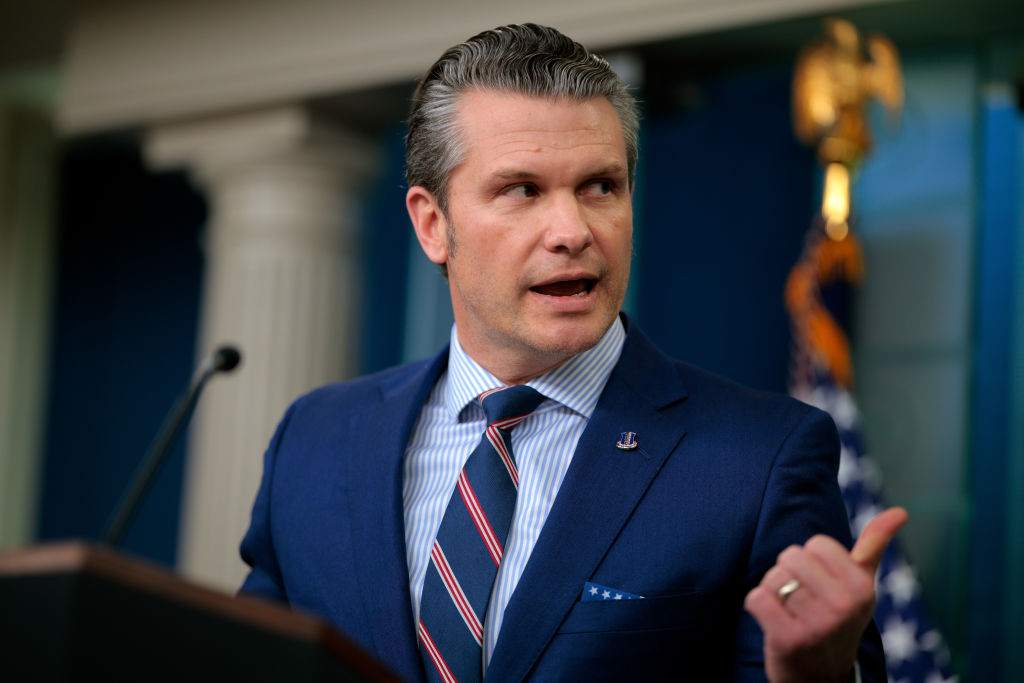
To be clear, Trump’s victory wasn’t just an election loss for the majority of American women who voted against him; it was a cultural rejection of female power facilitated in large part by the manosphere—a toxic, hyper-masculine echo chamber of podcasters, influencers, and bloggers who have spent years weaponizing misogyny. Their movement laid the groundwork for this moment, and right now, it feels like they’ve won.
A little history
The manosphere gained early visibility during flashpoints like GamerGate in 2014, where online harassment campaigns targeted women in gaming and tech, and the horrifying 2014 Isla Vista shootings by Elliot Rodger, who left behind a manifesto filled with misogynistic grievances. These events reflected a growing backlash to the rise of feminist blogs like Jezebel, the increasing mainstreaming of feminism, and women’s voices being amplified in previously male-dominated spaces. This toxic ecosystem grew to include communities like incels (involuntary celibates), Men Going Their Own Way (MGTOW), and Men’s Rights Activists (MRAs), which have long framed feminism as a threat to their identity and power.
But as I sit with the weight of it all, one thing has become clear: if we are going to successfully combat this backlash, we have to build something stronger than outrage alone. Online activism has played a critical role in mobilization and awareness for progressive causes—just as it has for the manosphere—but it’s not enough on its own to win. We need spaces for women in every arena: online, in real life, in activism, in community, and in joy.
We need a womansphere. Because the antidote to the manosphere isn’t just resistance—it’s connection.
The manosphere certainly creates connections but around the worst things. Modern-day manosphere leaders like “alpha” strongman Elliott Hulse, who preaches male dominance and rails against feminism, and far-right provocateur Nick Fuentes, the “your body, my choice” jackass who never met a nazi salute he didn’t like, exploit this resentment toward women, promoting hyper-masculinity as a cure-all for a world they claim is dominated by “woke” ideologies. Their messaging finds fertile ground in online forums like 4chan and Reddit, where misogyny and grievance politics are celebrated. Figures like Andrew Tate openly normalize violence against women, while he currently awaits trial on human trafficking and rape charges.
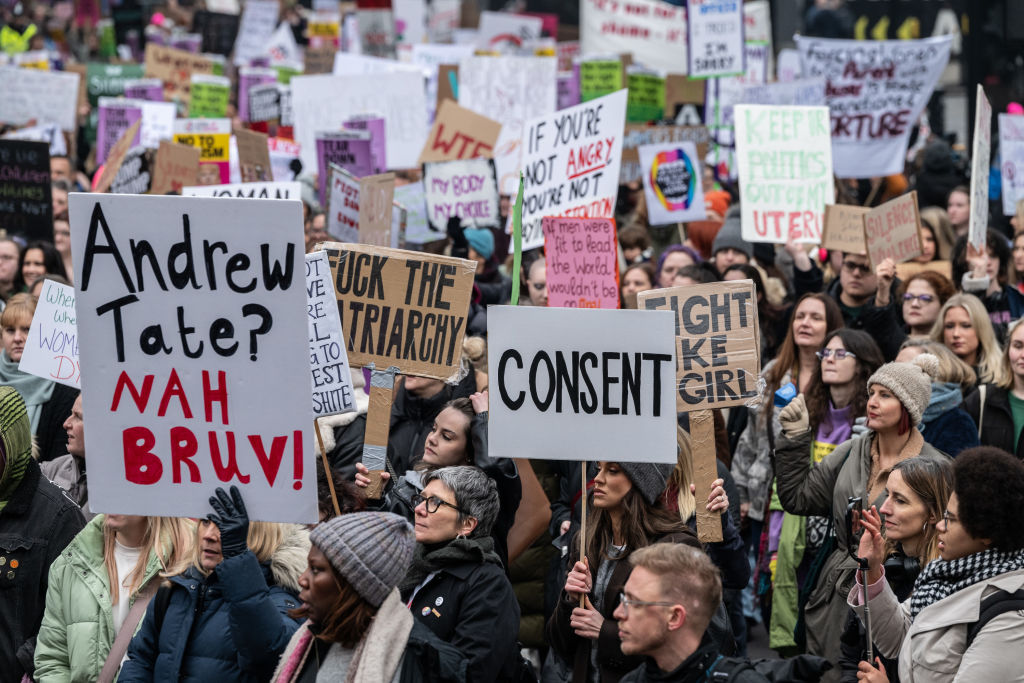
The manosphere now actively recruits vulnerable young men through everything from bodybuilding forums to gaming livestreams, and thrives on creating enemies: women, feminism, and anyone challenging the status quo. Fear, blame, and division remain the cheap fuel that powers this system, pulling in disillusioned men and weaponizing their grievances against progress.
After the election, it felt as if the manosphere was unstoppable. But then I received an invitation to attend a meeting in San Jose with a group called the Gigis, a community created for “midlife women to gather, grow, and give back.” This regular gathering of nearly 60 women wanted me to lead them in a discussion about what they could do in the aftermath of the election. During our two-hour meeting, some of the women said they were exploring a run for office. Others were starting nonprofit organizations to serve their neighbors. And others were going back to school to hone their activism skills. But all of the Gigis were committed to coming together to encourage each other to keep going.
Like the manosphere, this is a community, and the point of communities—of all types—is to help us find our purpose, test and hone our values, and be a part of something greater than ourselves. I’ve seen firsthand through Moms Demand Action that communities are where the real change happens—in ourselves and in the world. Not only is Moms Demand Action one of the largest grassroots organizations in the nation, but it’s also the largest real-life laboratory for helping women find their people and, in turn, their power. And that’s where we need to focus our energy: on creating in-person spaces that inspire connection and collective action. Unlike the manosphere, which thrives online by feeding on anger and fear, what I’m advocating for is grounded in real, face-to-face relationships, that foster compassion and collaboration. That’s the crucial difference between their network and what I’m calling the womansphere—we don’t just build ideas, we build bonds.
The manosphere understands that people crave belonging, even if their version rallies around a fear of inadequacy. But a healthy community—even if it’s just a handful of people—can help us feel connected to others and feel like we're part of something larger than ourselves. The manosphere thrives on reinforcing outdated power structures. The womansphere reimagines them entirely, creating a space for equity, inclusivity, and growth. Online and offline, where women can connect without fear.
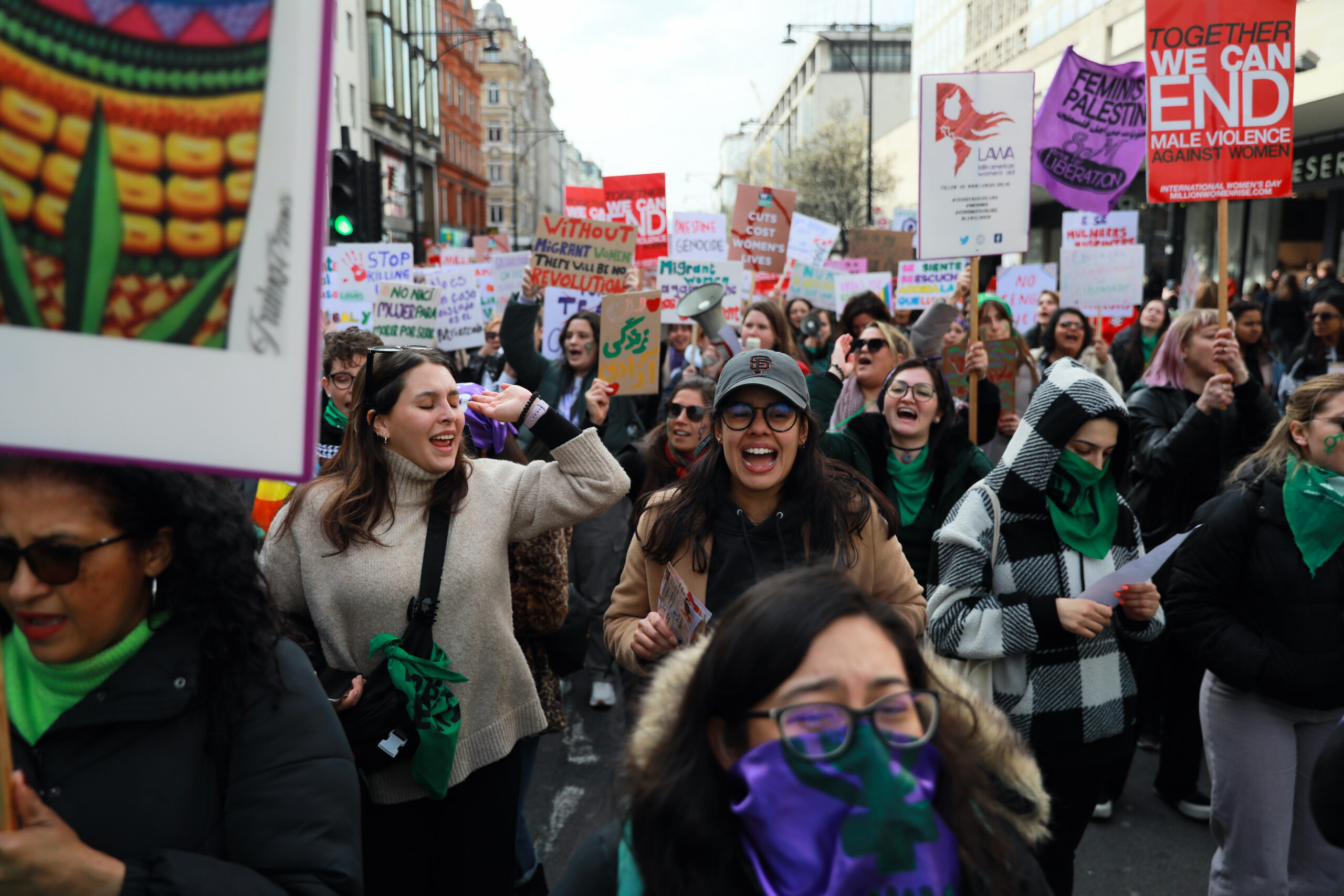
Sitting with the Gigis—knowing that women everywhere, of all different walks, are meeting in their own groups—I realized that the most effective resistance to the Trump administration won’t be en masse, but underground—and it will start in small communities. We need a womansphere where we can come together in person from all walks of life to feel empowered, supported, and seen. We need in-person communities where women can have conversations, despite their levels of education or political views. We need more media and platforms to lift up women’s stories, leadership, and solutions. We need to celebrate and center diverse leadership and lived experiences. And we need to create a womansphere that is as loud and visible as the manosphere, but infinitely more constructive.
To be clear, I’m not talking about the existing “tradwife” communities, where women advocate for a return to regressive, hyper-traditional gender roles and use “feminine wiles” as power. Our womansphere is about real progress, inclusivity, and collaboration—not performative or nostalgic ideas of femininity. The womansphere isn’t just a rejection of toxicity; it’s a blueprint for a better, inclusive future.
The manosphere won’t go down without a weird, gross fight. Right now, they’re gloating, emboldened by political wins and all those inaugural ball invitations. But that’s all the more reason to double down on creating an alternative. In this moment, women, as always, face the harder job. Instead of tearing things down, we’re tasked with building something meaningful, something that endures. We need to work towards something, not against it. And while feminist spaces have historically had their own moments of conflict and division, this new womansphere can learn from the past and make constructive collaboration its guiding principle.
Build your community. Find your people. Start the conversation. This isn’t about perfection; it’s about progress. The womansphere starts now, and it starts with us.
And seriously, our content is way better anyway. Here are a few ways to enter the womansphere:
Podcasts
- America, Who Hurt You?
- Pulling the Thread
- The Amendment
- News Not Noise
- My So-Called Midlife with Reshma Saujani
- Not Gonna Lie with Kylie Kelce
- UNDISTRACTED, with Brittany Packnett Cunningham
Mission Driven Groups
- National Women's Defense League, a nonpartisan organization dedicated to preventing sexual harassment and protecting survivors.
- TOGETHXR, a media and commerce group founded by some of the world’s greatest athletes.
- Women in AI (WAI), a nonprofit do-tank working towards inclusive AI that benefits global society.
- Project Dandelion, a women-led global campaign for climate justice.
- GenderLib, an emergent and innovative grassroots and volunteer-run national collective that builds direct action, media, and policy interventions centering bodily autonomy
- Moms First, grassroots community of moms and supporters taking action in their homes, workplaces, and communities.
Inclusive Journalism:
- The Persistent, a digital journalism platform committed to amplifying women's voices, stories, ideas, and perspectives.
- The 19th News, an independent, nonprofit newsroom reporting on gender, politics and policy.
- them, the award-winning authority on what it means to be LGBTQ+ today — and tomorrow.
- The Gist, a women-led, inclusive, and empowering sports community made for everyone.
- The Meteor, a multimedia company centering the lives of women, girls and nonbinary people. (Hi, that’s us!)
Social Media Darlings:
Emily Amick (@emilyinyourphone)
Your Virtual Anti-Disinformation Bestie (@the.wellness.therapist)
Becca Rea-Tucker (@thesweetfeminist)

Shannon Watts is an author, organizer, and speaker. She founded Moms Demand Action and recently organized one of the largest Zoom gatherings in history, mobilizing women voters for the 2024 Kamala Harris campaign. Her new book Fired Up is coming in 2025.
“You can’t rewrite a statute with a Sharpie”
 January 30, 2025 Greetings, Meteor readers, Too much is happening at once.  In today’s newsletter, we take a close look at the many anti-DEI actions Trump has put in motion, and what they mean in real life. Plus, what to expect at this year’s Grammys. Resting my eyes, Shannon Melero  WHAT'S GOING ONThe ripple effects of the DEI crackdown: The morning after the aircraft collision over the Potomac River on Wednesday night, Trump was busy blaming the DEI policies of Biden and Obama for the crash. “Their policy was horrible,” he said, “and their politics was [sic] even worse.” His evidence-free rant is just the latest move of his administration’s obsessive, all-out assault on diversity, equity, and inclusion programs. So what do Trump’s slew of executive orders, freezes, and attacks on programs that help people of color, women, and LGBTQ+ people thrive actually mean? Before we parse out what we should expect, let’s first review what’s happened. On his very first day, Trump overturned Biden’s executive order on DEI, which, among other things, ordered all federal agencies to come up with equity action plans, which address discrimination in the workplace. The second Trump executive order, handed down the same day, went further, ending any DEI activities in the federal government and reversing core policies that have been around for decades, including a Lyndon B. Johnson-era order that required any workplace taking federal dollars to implement equal opportunity measures. The Trump administration made clear just how much they mean it: Tens of thousands of federal employees got an email directing them to report any colleagues trying to “disguise” DEI “by using coded or imprecise language” and promising that they’d face “adverse consequences” if they didn’t. This effort extends throughout the government. The Department of Justice was ordered to halt ongoing cases in its civil rights division, including police reform agreements negotiated in the final days of the Biden administration. The Department of Education removed more than 200 web pages with guidance for schools on how to implement DEI policies and create welcoming campus environments. And just last night, Trump issued an order that threatened to remove federal funding from schools teaching about things like transgender identity, white privilege, and unconscious bias (though it’s unclear how much of this will actually happen, given how difficult it is for the federal government to dictate curricula.) So, are you ready for the hopeful part? “These executive orders cannot change civil rights law,” says Amalea Smirniotopoulos, senior policy counsel at the NAACP’s Legal Defense Fund. “You can’t rewrite a statute with a Sharpie.” That means that hiring, say, only white people is still illegal. Denying a woman a promotion just because of her gender is still illegal. Firing someone for being gay is still illegal, even according to the rightwing Supreme Court. Which also means that if any federal employee experiences discrimination or workplace harassment, they still have rights under Title VII of the Civil Rights Act and can file a lawsuit against the federal government. And despite the administration’s attempt to frame DEI programs as “illegal and immoral,” the programs it’s ending “are lawful and have been upheld by courts in many cases,” says Smirniotopoulos, pointing to the NAACP’s success in winning an injunction to stop an anti-DEI executive order issued by Trump during his first term. She predicts these newer orders will face challenges, too. But that doesn’t mean this crackdown won’t have far-reaching effects. There’s the law, and then there’s enforcement. “The reason DEI programs exist in the first place is to help with compliance of civil rights laws,” Smirniotopoulos says. “If we see the federal government roll them back, there is a risk that they’ll allow discrimination to fester among their own workforce.” In other words, you’re still free to file a lawsuit alleging discrimination—but the guardrails and systems that might discourage discrimination to begin with may be deteriorating. This deterioration could be widespread, given how the current administration is “encouraging” the private sector to roll back DEI. Since the election, many private companies—from Walmart to McDonald’s to Amazon—already have. Anti-DEI efforts will also rob federal employees of things like volunteer affinity groups. “Employees are feeling that the loss of these programs [will deprive] them of community and the social network that’s essential in any workplace,” Smirniotopoulos says. “Your ability to succeed in your workplace isn’t just about your raw intelligence, it’s also about knowing how to navigate workplace dynamics, knowing the culture and norms. Those social factors can play just as much of a role in whether someone can thrive or get promoted.” For the federal government, the ultimate effect may be a working environment where swaths of the population feel unwelcome—which will hurt hiring and retention for government positions. (Many suspect this is part of the point; the president of the American Federation of Government Employees called the anti-DEI orders “a smokescreen for firing civil servants.”) A diminished federal workforce affects everything from getting through airport security quickly to making sure we have clean water. “When the federal government works well, it’s invisible,” Smirniotopoulos says. “When the federal workforce is attacked, that ultimately hurts all of us.” If you’re experiencing workplace discrimination or harassment: The Equal Opportunity Employment Commission technically still exists, but to be safe, we recommend contacting independent organizations like the ACLU, NAACP, or National Women’s Law Center to get advice on how to proceed. —Nona Willis Aronowitz AND:
 Two Pop Stars, Both Alike in DignityBeyoncé and Taylor Swift face off at the GrammysBY SCARLETT HARRIS  IN FAIR LOS ANGELES WHERE WE LAY OUR SCENE, FROM ANCIENT GRUDGE BREAK TO NEW MUTINY. (VIA GETTY IMAGES) It’s been an incredible year for women in pop, and this weekend at the 67th Grammy Awards the race for the highly coveted Album of the Year award is stacked with the gals who ruled the summer. Billie Eilish, Sabrina Carpenter, Chappell Roan, and Charlie XCX are among the nominees. And while each of these women has a strong chance of taking home the gold, the real competition is between two titans of the industry—Taylor Swift and Beyoncé, who have 157 nominations and 46 wins between them. This weekend promises to be a kind of referendum on the notoriously racist and old-fashioned music establishment. All eyes will be on whether Bey, with “Cowboy Carter,” can finally clinch the Album of the Year award that has eluded her her entire career—or whether Grammy darling, Swift, will add to her already record-breaking tally of four AOTY golden gramophones with “The Tortured Poets Department.” The last time they were pitted against each other in this category was at the 2010 Grammys, for “I Am… Sasha Fierce” and “Fearless,” respectively, which Swift went on to win. This followed Kanye West’s infamous “I’mma let you finish” screed at the MTV Video Music Awards the year prior, in which he interrupted Swift’s acceptance speech for Best Female Video for “You Belong With Me,” asserting that Beyoncé had one of the best videos of all time and should have won for “Single Ladies (Put a Ring On It).” (He wasn’t wrong.) Ever the consummate professional, Bey had invited a deer-in-the-headlights, 19-year-old Swift back on stage during her own acceptance for Video of the Year so she could give the speech truncated by West.  WEEKEND READING 📚On stoking division: Anti-immigration policies are creating a wider divide in already fragile Latine communities. One Mexican/Puerto Rican writer shares what that looks like for her family. (New York Times) On letting the dead rest: A new documentary about Selena Quintanilla called Selena y Los Dinos has some wondering where to draw the line between honoring late artists and profiting off their tragic stories. (Refinery 29) On sex and other cities: A new character has emerged from the manosphere: the “passport bro.” While that may sound like a cool name for travel buddies, it’s just the latest depraved rebrand of sex tourism. (The Baffler)  FOLLOW THE METEOR Thank you for reading The Meteor! Got this from a friend? Sign up for your own copy, sent Tuesdays and Thursdays.
|
![]()
Two Pop Stars, Both Alike in Dignity
Beyoncé and Taylor Swift face off at the Grammys
BY SCARLETT HARRIS
It’s been an incredible year for women in pop, and this weekend at the 67th Grammy Awards the race for the highly coveted Album of the Year award is stacked with the gals who ruled the summer. Billie Eilish, Sabrina Carpenter, Chappell Roan, and Charlie XCX are among the nominees. And while each of these women has a strong chance of taking home the gold, the real competition is between two titans of the industry—Taylor Swift and Beyoncé, who have 157 nominations and 46 wins between them.
This weekend promises to be a kind of referendum on the notoriously racist and old-fashioned music establishment. All eyes will be on whether Bey, with “Cowboy Carter,” can finally clinch the Album of the Year award that has eluded her her entire career—or whether Grammy darling, Swift, will add to her already record-breaking tally of four AOTY golden gramophones with “The Tortured Poets Department.”
The last time they were pitted against each other in this category was at the 2010 Grammys, for “I Am… Sasha Fierce” and “Fearless,” respectively, which Swift went on to win. This followed Kanye West’s infamous “I’mma let you finish” screed at the MTV Video Music Awards the year prior, in which he interrupted Swift’s acceptance speech for Best Female Video for “You Belong With Me,” asserting that Beyoncé had one of the best videos of all time and should have won for “Single Ladies (Put a Ring On It).” (He wasn’t wrong.) Ever the consummate professional, Bey had invited a deer-in-the-headlights, 19-year-old Swift back on stage during her own acceptance for Video of the Year so she could give the speech truncated by West.
The two have been eerily linked ever since: fans noticed Beyoncé dropped her groundbreaking self-titled visual album at midnight on Swift’s birthday in 2013. The streaming debut of Swift’s The Eras Tour concert film was released on the 10th anniversary of that self-titled album. (Queen Bey showed up to the film’s red carpet premiere, quashing any lingering rumors of beef between the two.) They are the only two women to debut a single at number one on the country charts. And both dominated the cultural conversation in 2024, a year full of women taking back and transforming pop music.
Despite pretty much every other awards body and cultural arbiter giving Bey her dues, and despite a trio of standout albums in BEYONCÉ, Lemonade, and Renaissance, the Grammys routinely withholds AOTY from her (this is her fifth nomination). As writer Kathleen Newman-Bremang explained last year—after Jay-Z accepted the Dr. Dre Global Impact Awards at the Grammys and slammed the Academy in his acceptance speech— Black music is often relegated to the genre categories like R&B, rap, and dance, which Renaissance won in in 2023. Albums by Black women seldom win the general categories like Album of the Year—which was last won by a Black woman in 1999 with The Miseducation of Lauryn Hill.
“[Calling] Black artists the greatest of all time… would require admitting the power of Black art, it would require acknowledging the history of cultural pillaging and musical theft of Black work that the industry was built on,” Newman-Bremang wrote at the time.
Cowboy Carter is a direct response to that kind of racism in the industry, featuring Linda Martell, a Black country pioneer, and her modern-day contemporaries Shaboozey, Tanner Adell, Brittney Spencer, Tiera Kennedy and Reyna Roberts. Despite being her most critically polarizing album in over a decade, Bey will probably win for what is, in my opinion, her weakest body of work since 4. That is if Swift doesn’t best her for the similarly conflictingly reviewed and unwieldy The Tortured Poets Department.
Of course, Grammy voters might surprise us and hand the award over to one of the freshly crowned pop princesses, like Sabrina Carpenter or Chappell Roan. But the fact that Beyoncé will actually be attending the award ceremony this year tells me she expects to be leaving with some hardware. Or perhaps everyone’s just there to have a good time and we’ll still be waiting for an AOTY award in another 15 years (you know, if society holds up in the meantime).


